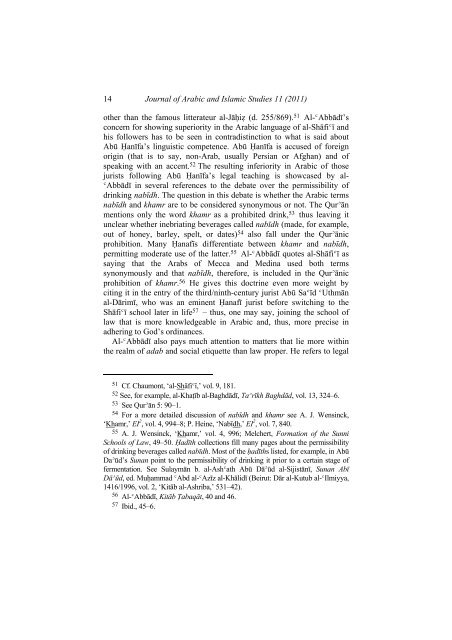JOURNAL OF ARABIC AND ISLAMIC STUDIES
JOURNAL OF ARABIC AND ISLAMIC STUDIES
JOURNAL OF ARABIC AND ISLAMIC STUDIES
You also want an ePaper? Increase the reach of your titles
YUMPU automatically turns print PDFs into web optimized ePapers that Google loves.
14<br />
Journal of Arabic and Islamic Studies 11 (2011)<br />
other than the famous litterateur al-Jāḥiẓ (d. 255/869). 51 Al-ʿAbbādī’s<br />
concern for showing superiority in the Arabic language of al-Shāfiʿī and<br />
his followers has to be seen in contradistinction to what is said about<br />
Abū Ḥanīfa’s linguistic competence. Abū Ḥanīfa is accused of foreign<br />
origin (that is to say, non-Arab, usually Persian or Afghan) and of<br />
speaking with an accent. 52 The resulting inferiority in Arabic of those<br />
jurists following Abū Ḥanīfa’s legal teaching is showcased by al-<br />
ʿAbbādī in several references to the debate over the permissibility of<br />
drinking nabīdh. The question in this debate is whether the Arabic terms<br />
nabīdh and khamr are to be considered synonymous or not. The Qurʾān<br />
mentions only the word khamr as a prohibited drink, 53 thus leaving it<br />
unclear whether inebriating beverages called nabīdh (made, for example,<br />
out of honey, barley, spelt, or dates) 54 also fall under the Qurʾānic<br />
prohibition. Many Ḥanafīs differentiate between khamr and nabīdh,<br />
permitting moderate use of the latter. 55 Al-ʿAbbādī quotes al-Shāfiʿī as<br />
saying that the Arabs of Mecca and Medina used both terms<br />
synonymously and that nabīdh, therefore, is included in the Qurʾānic<br />
prohibition of khamr. 56 He gives this doctrine even more weight by<br />
citing it in the entry of the third/ninth-century jurist Abū Saʿīd ʿUthmān<br />
al-Dārimī, who was an eminent Ḥanafī jurist before switching to the<br />
Shāfiʿī school later in life 57 – thus, one may say, joining the school of<br />
law that is more knowledgeable in Arabic and, thus, more precise in<br />
adhering to God’s ordinances.<br />
Al-ʿAbbādī also pays much attention to matters that lie more within<br />
the realm of adab and social etiquette than law proper. He refers to legal<br />
51 Cf. Chaumont, ‘al-Shāfiʿī,’ vol. 9, 181.<br />
52 See, for example, al-Khaṭīb al-Baghdādī, Taʾrīkh Baghdād, vol. 13, 324–6.<br />
53 See Qurʾān 5: 90–1.<br />
54 For a more detailed discussion of nabīdh and khamr see A. J. Wensinck,<br />
‘Khamr,’ EI 2 , vol. 4, 994–8; P. Heine, ‘Nabīdh,’ EI 2 , vol. 7, 840.<br />
55 A. J. Wensinck, ‘Khamr,’ vol. 4, 996; Melchert, Formation of the Sunni<br />
Schools of Law, 49–50. Ḥadīth collections fill many pages about the permissibility<br />
of drinking beverages called nabīdh. Most of the ḥadīths listed, for example, in Abū<br />
Daʾūd’s Sunan point to the permissibility of drinking it prior to a certain stage of<br />
fermentation. See Sulaymān b. al-Ashʿath Abū Dāʾūd al-Sijistānī, Sunan Abī<br />
Dāʾūd, ed. Muḥammad ʿAbd al-ʿAzīz al-Khālidī (Beirut: Dār al-Kutub al-ʿIlmiyya,<br />
1416/1996, vol. 2, ‘Kitāb al-Ashriba,’ 531–42).<br />
56 Al-ʿAbbādī, Kitāb Ṭabaqāt, 40 and 46.<br />
57 Ibid., 45–6.

















